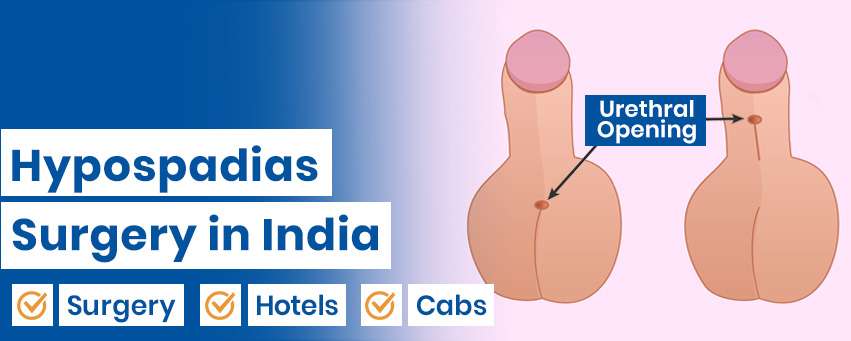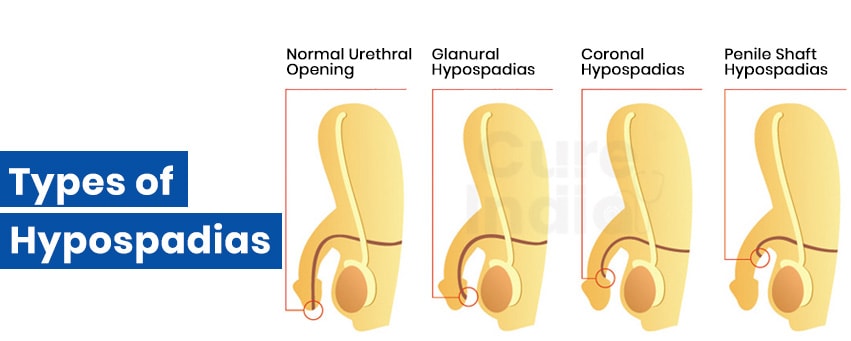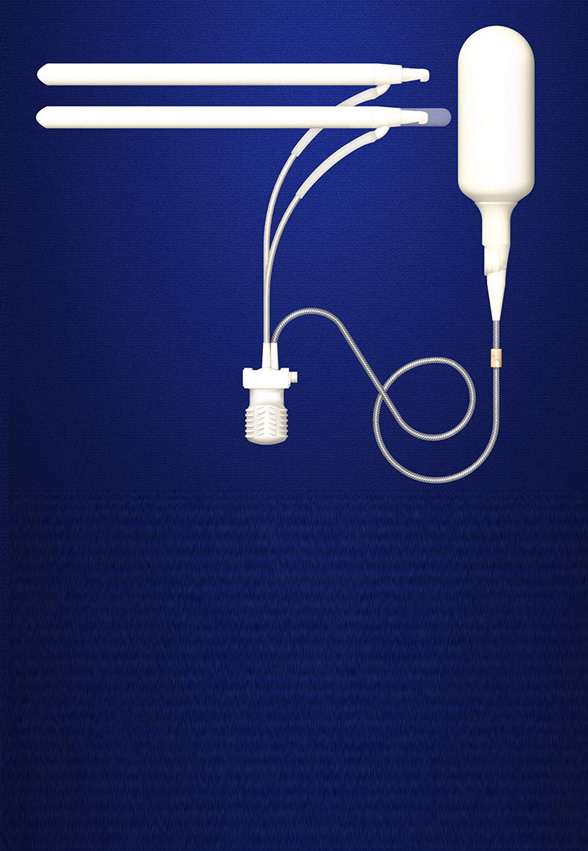

Hypospadias, which is also known as urethral meatus or hypospadiac urethra, is a congenital condition that occurs in boy babies, meaning it is a birth defect that arises in boys. It affects 1 boy in every 150 boys born and it is the 2nd most common type of birth defect that affects the children. Normally, the urethra is an organ of the urinary system that carries the urine from the urinary bladder to the tip of the penis from where it gets excreted from the body. Under this condition, the end of the urethra (where it ends at the penis tip) is formed abnormally, and instead of ending at the tip of the penis, it ends on either underside, middle, or bottom of the penis due to which the urine comes out from the different part rather than through the tip of the penis. This condition cannot be cured on its own and it needs surgical intervention to correct the malformation.
In many low and middle-income countries, many parents are not aware that the condition is treatable with surgical intervention, so they don’t seek the correct medical care in the first place. Secondly, these countries have a lack of trained pediatric surgeons who can perform the surgery to repair this condition successfully without any post-operative complications. It has been reported that many patients suffer from post-operative complications and some even die during the surgery.
Seeking the right diagnosis and hypospadias procedure, many African parents from countries like Kenya, Ethiopia, Tanzania, and Ghana travel for hypospadias surgery in India. They choose India among the many countries in the world because it is the most affordable option they have where they can receive world-class medical care at a much lower cost. India has a lot of highly skilled and trained pediatric surgeons who are experts in their respective fields and are members of many international associations.
The main symptom of Hypospadias disease is that the opening of the urethra is malformed and instead of opening at the tip of the penis, it has opened elsewhere on the penis. Because of this, instead of coming out from the tip of the penis head, the urine comes out from other areas. The other common symptoms of this condition are listed below:
There are different hypospadias types depending on the location of the urethra opening. The different urethral meatus types are:

There are several types of hypospadias and they depend on the positioning of the opening of the meatus.
■ Glanular urethral meatus: when the urethra opening is slightly lower than its original location but it is still at the head part of the penis.
■ Subcoronal urethral meatus: when the urethra opening is slightly lower than its actual location and it is slightly below the head of the penis.
■ Distal urethral meatus: when the urethral opening is located between the head and middle shaft of the penis.
■ Midshaft urethral meatus: it is when the urethral opening is located close to the middle part of the penis shaft.
■ Proximal urethral meatus: when the urethral; opening is located near the penis base within the scrotum.
■ Penoscrotal urethral meatus: is when the urethral opening extends from the underside part of the penis to the scrotum.
■ Scrotal urethral meatus: when the urethral opening is located anywhere at the front or the bottom of the scrotum.
■ Perineal urethral meatus: when the urethral opening is located behind the scrotum, in front of the anus.
CureIndia helps you choose the best hypospadias doctor for your prostate surgery in India. Most of the doctors in our associated hospitals have been internationally trained and are active members of many international medical councils and associations. Let's hear from some of the most reputed hypospadias surgeon in India:




The hypospadias surgery cost in India depends on the location of the hospital, the surgeon’s fees, medication cost, travel cost, stay cost, any post-operative treatment, diagnostic consultation, insurance coverage, etc. However, the urethral meatus surgery cost in India can be on average $900 to $1,800. The cost of the same procedure in the USA ranges from $2,500 to $8,000.
| Treatment | Cost in India | Stay in India |
|---|---|---|
| Single Stage Hypospadias Surgery in India | 2,500 USD | 7 Days |
| Two Stage Hypospadias Surgery in India | 4,000 USD | 7 Days |
The cost of hypospadias surgery is lower in India as compared to developed countries like the USA. India not only provides affordable treatments, but the hospitals in India also provide premium treatment procedures at an affordable range of costs.
Hypospadiac urethra is a birth defect that can be caused if the child’s genes contain some alterations or if he has inherited the gene of his father, who also had this condition. The chances of a baby developing this condition increase if the mother doesn’t follow a healthy lifestyle during the pregnancy with this child. There is no natural cure for this condition, and only hypospadias surgery can correct this condition. A lot of low- and middle-income countries don’t have enough paediatric surgery experts, and so a lot of patients don’t receive the treatment. The parents travel to another country for the treatment of their child. India is the best country for getting hypospadias procedures done because Indian hospitals for hypospadias not only have the best paediatric doctors, but the affordability of the surgery can help you save a lot of money.
The exact cause of hypospadias in infants is not yet known. However, the researchers believe that this condition is caused by the combination of genetic and other factors such as the environmental factor of the mother, the diet of the mother, what medicines she was consuming during the pregnancy, etc. Some researchers suggest that the risk of a child born with hypospadiac urethra increases if:

It is highly recommended that you talk to your doctor and discuss the ways by which you can increase the chance of giving birth to a completely healthy baby.
As already mentioned, urethral meatus is a very common congenital disease among baby boys and the most popular method of treatment is through hypospadias infant surgery.
The first step of hypospadiac urethra repair treatment is diagnosis. Your baby is diagnosed with this disorder after birth when the doctors conduct a physical examination. The condition is easy to diagnose as the penis has an unusual curvature that is noticeable. However, in some cases, if the condition is mild, then it may not be easily noticeable and you may need to bring your baby to the doctor again after you notice some of the symptoms.
The type of deformity your baby has will determine the type of treatment his hypospadiac urethra needs. The common method of treatment is hypospadias surgery which helps to rectify the issue. Hypospadiac urethra repair surgery is one of the oldest forms of treatment and is guaranteed to be successful.
The main aim of Hypospadias surgery in India is to reconstruct your baby's penis into a normal-looking one where the urethral opening or the meatus is at the tip of the penis head. During the surgery, the doctor will first straighten the shaft of the penis.
After the shaft is straightened, the surgeon will create a proper urinary channel which will have an opening at the head of the penis, right at the tip which is the common position for a meatus. After that, the doctor will reconstruct the foreskin or remove the excess.
There are several types of surgeries for urethral meatus treatment. Urethromeatoplasty is the most common form of treatment for glandular hypospadiac urethra. During this method of surgery, the surgeon creates a new opening or meatus of the urethra followed by reconstructing the head of the penis so that the opening is properly positioned.
In the case of penoscrotal urethral meatus, your baby will undergo two stages of surgery. The procedure is based long-term and the surgeon carries out the two stages of surgery six months apart. Generally, the surgeon uses the skin from the baby's mouth to reconstruct the urethral opening. The unusual split of the scrotum is eliminated, resulting in the elimination of the noticeable curvature of the penis during an erection.
The surgery usually lasts from ninety minutes for distal hypospadiac urethra to three hours for other types of surgeries. Regardless of the hypospadiac urethra type and surgeries, the surgeon will first straighten the penis before reconstructing the urethra. The ideal age for your baby to undergo these treatment procedures is usually 6-12 months. However, teens and adults can also undergo surgery in case the condition was not diagnosed at an early stage.
Before the surgery, your baby will be put to sleep with the help of general anesthesia. It will not affect your baby much and the surgeons will use all sorts of treatment methods that will make the post-surgery time painless.
After hypospadias surgery in India, the doctor will insert a catheter in your baby’s penis so that the urine doesn’t affect the freshly done surgery. The tube or the catheter is usually attached for several days and is connected to a diaper.
Don’t worry the tube or the hypospadiac urethra surgery will not cause too many problems for your baby. This is why most doctors prefer the surgery before the babies are a year old. The early treatment causes less discomfort and pain unlike the late treatment in adults.
Moreover, many drugs have been introduced to manage the pain so your baby will not face any painful circumstances after the surgery. In case of bladder issues, the doctor may prescribe your baby some medication, which you must remember.
Once your baby comes home after the surgery, you must take full responsibility to care for the wound after the surgery. You must follow what your doctor recommends.
Hypospadiac urethra is a birth defect that can be caused if the child’s genes contain some alterations, or if he has inherited the gene of his father who also had this condition. The chances of a baby developing this condition increase if the mother doesn’t follow a healthy lifestyle during the pregnancy with this child. There is no natural cure for this condition, and only surgical intervention can correct this condition. A lot of low and middle-income countries don’t have enough pediatric surgery experts and so a lot of patients don’t receive the treatment. The parents travel to another country for the treatment of their child. India is the best country for the hypospadias treatment because Indian hospitals not only have the best pediatric doctors but the affordability of the surgery can help you save a lot of money.


Suffering from Erectile Dysfunction
Open up and get treated
Semi Rigid and Inflatable Penile Implants
Get back the Erection
Insecure about your size
Get Penile Augmentation